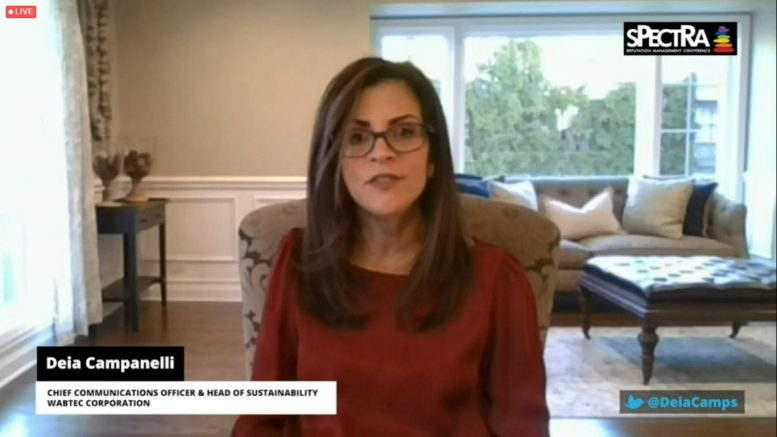Today, disruption is everywhere and the companies which incorporate innovation as a part of their ethos, are the ones which are able to thrive in this dynamic environment. Great companies are always transforming.
These were few of the opening remarks made by the keynote speaker Deia Campanelli, Chief Communications Officer & Head of Sustainability at Wabtec Corporation on Day 2 of SPECTRA. She talked about the importance of communicating culture at workplace and beyond
All the great companies recognise the power of purpose in this day and age. Purpose is a company’s fundamental reason for being. Campanelli believes that purpose unites a company and almost creates a social movement from within. The key to communicating a purposeful culture starts with a compelling story, committed leaders and the employees whose belief aligns with that of the company
Campanelli shared a finding from Harvard Business Review, stating the importance of good storytelling as it motivates people to take action based on what they have seen. But a lot of companies have not been successful in this aspect and she believes it is because we are more focused on what we want people to know rather than tapping on the company’s purpose to create empathy from the consumers. Leaders today are having a hard time communicating and bridging the gap between what a company says and what it does, which is very crucial for purpose. Campanelli talked about how purpose fails when the message and the messenger do not align with each other. The third important aspect of communicating purpose is through rituals and symbols. Symbols give substance to our words and meaning to our actions according to her. There are many aspects of this communication that take place without our knowledge, which includes hiring practices, budgets and even the office design. Campanelli advised the viewers to acknowledge the power of these symbols and use them in the best interest of the company.
In conversation with Payal Banerjee, Sequoia Capital
What are the tools and skills communicators need in order to be very effective and impact when dealing with distributed teams across the globe?
The pandemic has created a world of uncertainty around us and in crisis employees look up to the leaders for clarity. It is important for leaders to focus on clear, consistent and empathetic communication. This is crucial as the employees have a need to understand the actions and decisions of the leaders, to feel connected to the company.
How can a leader ensure that they maintain the very necessary skill of empathy and kindness while at the same time realising that they have to sometimes make tough business decisions?
As the feeling of isolation has increased during the pandemic, the employees are more desperate to hear from their leaders. So the leaders need to maintain constant communication with them. This communication is not just limited to checking in on them but also actively listening to their problems. During these times, the leaders need to make sure that the employees are still focusing on the company’s purpose along with their needs. Leaders also need to accept that in times of crisis, they might not have all the answers and that is okay. The important thing to do is being honest during communication.
What advice would you give to communications professionals today as they face business transformation at such a large scale?
Open and transparent communication is the key to driving successful business transformations. This is a time when our actions need to match our words
What do you think goes into building a strong culture communications and engagement framework?
In cultural communications today, good communicators are focused on not only getting the work done but also connecting the dots between strategy and operations, performance and culture in a way that increases engagement. There needs to be a room for feedback and discussions in order to foster culture engagements.
Which type of communication do you find exciting, external or internal, and why?
It is not one or the other, telling the story as a communicator both internally and externally is really important and being able to do it for a purpose filled company is very exciting, Campanelli on her experience with Wabtec Corporation
What are the key trends in cultural communications that have caught your attention in the past few years?
There has been an increase in video content and focus on internal communications in the light of COVID. There will also be the use of live video, and not just Zoom and Teams, in a more authentic way. Sharing of stories on social platforms has also taken the center stage where the stories feel more real.
How do you see reputation management evolving in the next few years? What are key emerging trends that we need to keep an eye on?
In the next five years, we will see a greater commitment from brands to address societal change, environmental change and healthcare change. We might also witness a greater willingness from business leaders to be vocal about those issues. In the next few years, taking a stand on these issues will become a normal, a standard and not an exception.
Key Takeaways
Purpose in not passive and linear, it is transformational in nature
Leaders need to make a conscious effort to stay connected with their employees especially during crisis
The company purpose is not only displayed in our words but also in our actions, rituals and symbols.
The views and opinions published here belong to the author and do not necessarily reflect the views and opinions of the publisher.



Be the first to comment on "#RTSPECTRA: Communicating Culture at the Workplace and Beyond"